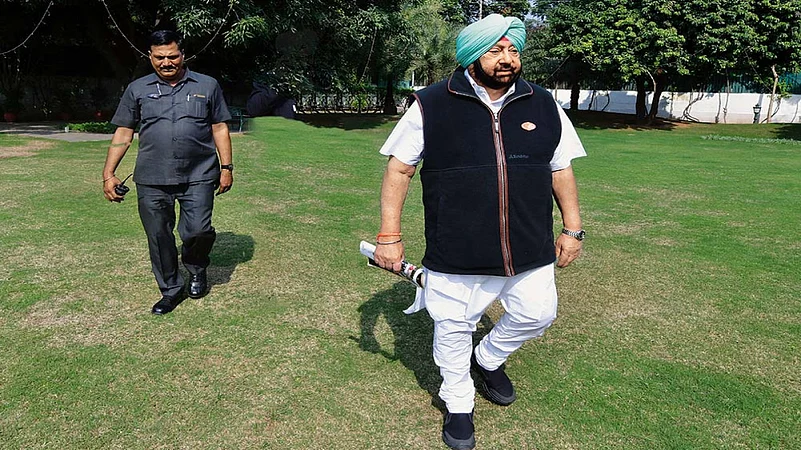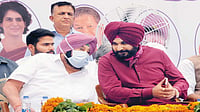In March 2017, while his party was facing successive electoral routs elsewhere in the country, Captain Amarinder Singh propelled the Congress to a rare and comprehensive poll triumph in Punjab. In 2019, as his party’s electoral fortunes showed no revival nationally, Singh ensured that eight of Punjab’s 13 Lok Sabha seats went to the Congress. Now, a year away from the 2022 Punjab assembly polls, the 79-year-old Singh, one of just three Congress chief ministers across India, has his task cut out–to retain the Grand Old Party’s hold over Punjab while deftly navigating his state through socio-economic challenges posed by the Covid pandemic and the ongoing farmers’ agitation. In an exclusive interview to Puneet Nicholas Yadav, the Patiala Royal explains his government’s priorities for the crucial year ahead and why his plans to retire from electoral politics will have to wait. Excerpts:
Your government completes four years in office this month. What are your priorities and challenges for the year ahead?
We came to power four years ago with the promise of providing our people with much-needed relief from the social and economic burdens they had been subjected to by the erstwhile SAD-BJP regime. There were huge challenges because of the mess we had inherited, but one by one, we started ticking off the list of promises we had made in our election manifesto. We have now implemented 84.6% of our poll promises— a record for any political party in any state. And, we have done this despite the Covid crisis.
As we move into the last year of the current term, we are fully geared to implement our remaining promises. I know this is still not enough to transform Punjab back into the top-ranking state that it once was before the SAD-BJP combine started destroying it step by step. Hence, I have laid out an agenda for 2022. It is basically a set of seven priorities, which we are moving aggressively to act upon. I have already unveiled the agenda, and the process of executing it has started full steam. Individually and collectively, the seven priorities are all aimed at ensuring a ‘Kaamyab’ and ‘Khushal Punjab’.
I know, and so do the people, that these 12 months are not enough to translate this vision into reality. Frankly, this is the biggest challenge before us. Of course, there are other challenges too—the prolonged farmers’ crisis which is impacting us in unimaginable ways, the lack of central support for our state—we aren’t even getting our dues. The revival of the economy which was barely emerging from the legacy of the previous government when the Covid crisis hit (is a challenge)
For Punjab and its economy, first the Covid pandemic and then the farmer protests—it’s been a double whammy. How is your government dealing with the economic fallout?
Yes, Punjab has been at the receiving end of the crisis. We were barely recovering from the fiscal mess we had inherited from our predecessors when Covid came and then this whole problem over the farm laws, which frankly could have been totally avoided had the Centre not chosen to intrude into the states’ domain, and that too in this dictatorial manner. Covid caused us to suffer revenue loss of about Rs 3,000 crore a month. We are yet to figure out the cost of the farmers’ crisis—I am only talking of economic cost, not the socio-political cost which is also huge.
Our resources are limited, and with little or no support from the Centre, we have to depend on prudent management and optimisation of our resources. It is a fine balancing act that my Finance Minister Manpreet Badal and his team are trying to do every day. Allocation and reallocation of resources is a challenge we are trying to manage by bringing more cost efficiencies into the system. I have asked all departments to cut costs judiciously, and think out of the box. We shall continue to do so, but at the same time, the Central government needs to step in and fulfill its responsibility towards the states, particularly Punjab.
The Centre and the farmers are equally unwilling to back down from their respective positions. How does one break the stalemate?
Dialogue is the only way out, and unfortunately, that dialogue is not happening. It stopped after 11 rounds of talks. Both sides should have continued to engage with each other. I don’t know why they have stopped talking, and I would like to urge both sides to get back to the discussion table. At the same time, I appeal to the Central government to accept the farmers’ demand for repeal of the laws and bring fresh legislations after due discussion with the farmers and other stakeholders. If the Centre is willing to put the farm laws on hold for 18 months, why not simply withdraw and start afresh.
You’ve repeatedly warned of internal instability in Punjab and rest of India due to the ongoing agitation.
Let us not forget that Punjab is primarily an agrarian economy, and our farmers are the backbone of this economy.
Unfortunately, our farmers are now suffering unimaginable woes. We all know that such turmoil can easily lead to instability, which our enemies beyond our borders are always on the look-out to exploit. The situation is not just grim, it is dangerous. This danger is palpable; it can be seen in the large number of weapons and drugs being smuggled into Punjab via drones from across the borders. We have seen a significant increase in such activity over the past few months.

The Punjab assembly, like some other Opposition-ruled states, had passed a resolution against the CAA. With the farm laws too your government brought a law to negate the Central laws. Since CAA and the farm laws are central legislations, how long can you delay their implementation?
The same holds for the state amendment Bills against the farm laws. The farm laws are against the federal structure and are, thus, unconstitutional. How can the Centre push laws on a state subject, which agriculture is, without consulting the states? Our Bills against the farm laws are constitutionally valid, under Article 254 (II).
During the 2017 Punjab polls, you had declared that it was your last election. You had also said that the Congress should choose and declare your successor within your CM tenure to ensure smooth transition. Is Capt. Amarinder Singh going to retire from electoral politics next year?
Yes, I did say in the run-up to the 2017 assembly polls that I did not intend contesting again. But that was before I and my colleagues discovered how bad the situation in Punjab really was, and how big the mess left behind by the Akalis and BJP was, and how important it was to pull our people out of this. So it was not long thereafter that I had made it clear that I will fight again if that is what it takes to wipe the tears from the face of every Punjabi—which I had vowed to do before the 2017 elections. I have maintained that position consistently. I will not leave my people in the lurch. Retirement will have to wait.
How is your equation with Navjot Sidhu now? You invited him for a meal some months back. Has there been a thaw?
There was never any tension, so where is the question of a thaw? I have never had any problems with Navjot, whom I have known since he was a little boy. We have always had very cordial personal relations. If he has chosen to stay out of the government for now, it is his decision, which I respect. If he wants to come back to my cabinet, the Power portfolio is still open for him.
The Congress party’s main political rival in Punjab, the SAD, seems rudderless at the moment. The farmer protests have also effectively ended any chance of BJP gaining ground in the state. Is AAP now your main challenger in the state as you seem to attack AAP more frequently these days than the SAD?
That’s your perception and you only have to look at the recently-concluded civic polls in Punjab to see how misplaced this perception is. AAP in Punjab is as rudderless as the other opposition parties, including the SAD. As for attacking AAP, I am not keeping a count of how many times I have reacted to whom. I have always responded spontaneously to situations. I’ll leave the counting to the media.
Nationally, it’s been almost two years since the Congress has been trying to find a full-time party chief. A section of your party leaders have been repeatedly criticising the drift within the Congress. How do you see this unraveling?
I do not see the relevance of this question when we already have a duly elected full-time president in Sonia Gandhi. She will eventually step down, and she has already announced that the party will elect a new president over the next few months. There is a transition that always happens, from time to time, in every party. When the time comes, it will happen again in the Congress, and till that time, Sonia remains our unquestioned leader.


























